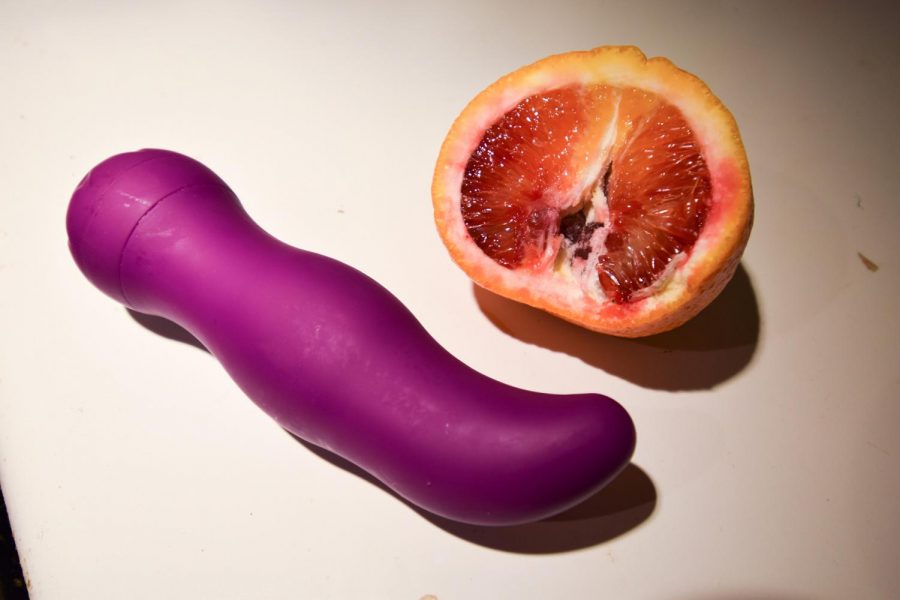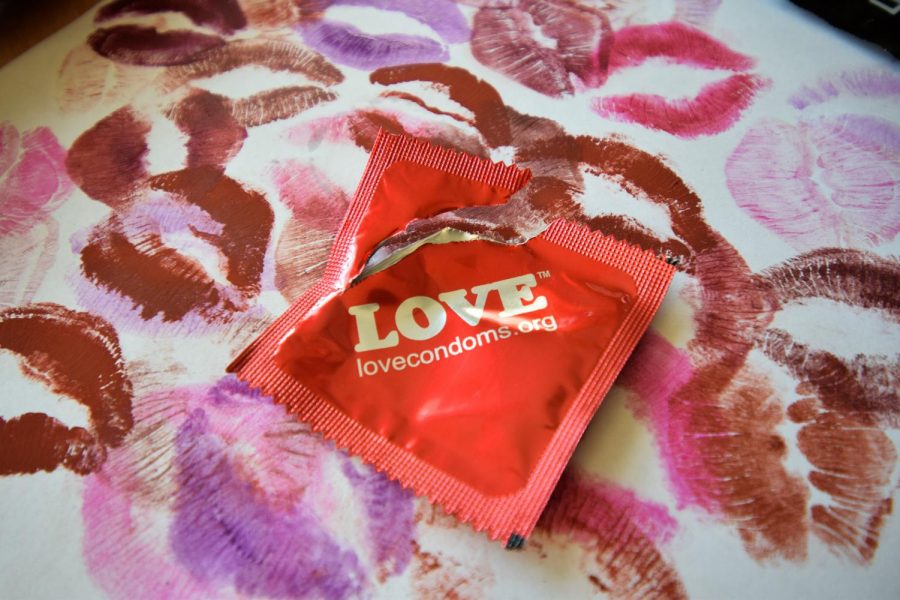Sex & Pleasure: The Good, The Bad, The Kinky
According to the American College Health Association’s 2019 Assessment, 52% of sexually active undergraduate students reported that they used contraception the last time they had vaginal intercourse. 27% reported using a condom during anal intercourse within the last 30 days.
“Learning how to experience pleasure and be intimate with one another is a vital part of our human experience. And if we continuously forget that, then we can do everything in the world to attend to all those other parts of ourselves, but if we’re forgetting about or ignoring our sexuality, it’s going to creep up in unexpected ways,” Fiona O’Farrell, LMFT, CST, said.
O’Farrell is a relationship, sex and intimacy therapist who owns a practice called Adaptive Counseling in Ballard. She is also the director of the sex therapy program at Antioch University.
Though conversations around sex and sexual health may center on either sexually transmitted infections or erectile dysfunction, O’Farrell highlighted pleasure as one of the central elements to how we talk about sex. According to O’Farrell this pleasure doesn’t just refer to sexual stimulation or orgasm—it can refer to a variety of sensual experiences, such as the smell of fresh grass, the taste of a good cookie or the feeling of the sun on your face.
O’Farrell said that improving our relationship to pleasure means navigating the day with “Pleasure on the forefront of your mind.” She said that it’s important to ask the questions, “What brought me pleasure? What pleasurable experiences would I like more of in my life?”
“We need to start realizing that a lot of experiences we have in our life can help us understand who we are as sexual beings,” O’Farrell said. “What do I notice about my body when I have these pleasurable experiences? Can I relate that to anything, if I’m thinking of sexual pleasure? Is eating an ooey gooey chocolate cake kind of similar to what happens when you masturbate?”
In paying attention to and noticing pleasure, O’Farrell said that we can begin to figure out what we do want out of our sexual experiences rather than just focusing on what we don’t want. Further, she says this can make sex a much less confusing or stressful experience.
Solo Sex – Start With Yourself
Attention to pleasure often starts with solo sex—this is where many people can figure out what makes them climax and how these experiences can be pleasurable.
“For many people, the first sex that we experience is solo sex and self-pleasure. And it continues to be an important part for all genders really,” Lisa Szilagyi said. “How do you need to be touched, what gets you off? It’s different for everybody and that also opens up dialogue with your partner. When you know what you want, you’re able to explore that with somebody else.”
Szilagyi owns Wild at Heart, an adult store in Ballard. She sells a variety of toys that can help her clients figure out what they want out of sexual experiences and self-pleasure. She said that most clients start with her bestsellers: simple vibrators, fleshlights and various anal toys.
“Put on a bubble bath, light some candles. I always recommend just a small clitoral vibrator that has multiple speeds,” Szilagyi said. “For God’s sake, turn off your phone. Don’t bring your phone in there. Nothing’s so important it can’t wait a half hour, so just really be with oneself and explore your own body.”
By dedicating meaningful time to solo pleasure, Szilagyi said that you can learn about your body and what’s pleasing to you.
“How can you have an orgasm? How is that going to work?” Szilagyi said. “How long does it take? What are the stimulation patterns? Do you like vibration?”
Along those lines, O’Farrell said that solo sex is critical to a healthy sex life because it can show you a variety of other options for sensual experiences that you might not have considered in the first place.
“That’s why solo pleasuring is so important, because you’re going to have a way better buffet spread if you start with yourself,” O’Farrell said. “That’s another push for starting with yourself then inviting other people in, or being able to do both, because then you get to pick all the dishes that are out on your spread.”
However, solo sex is commonly shrouded in shame—particularly for those with vulvas. This shame can be a barrier to finding masturbation pleasurable, according to O’Farrell, who said it’s even more important for these folks to understand that self-pleasure is okay and healthy.
A major catch for students of all genders in university, however, can be the lack of privacy. For many—particularly those sharing a dorm room—it can be difficult to be alone long enough to adequately or appropriately self-pleasure.
“I know a lot of people are like, well, hopefully they don’t notice if I take an extra long shower, or there’s a buzzing coming out of my bedroom,” O’Farrell said. “You don’t have to announce to the world that like, ‘Hey, I’m going to go masturbate now,’ but maybe just having some conversations like, you know, my door is closed, and I’m playing Netflix really loud. Maybe leave me alone.”

“Sexual Debut” & College Culture of Sex – Know What You Want
Beyond just the problem of finding privacy in a dorm room, there are other ways that sex can be more complicated at universities—for example, this may be the time that many students are experimenting with sex for the first time.
With this complicated sexual landscape, many students may falsely assume that everyone else is more experienced than them when it comes to sex. According to O’Farrell, with power dynamics like this, one person may “default” to the person that they believe has more experience. The result: the “more experienced” person drives the sexual experience, instead of it being collaborative.
This can be especially true for those experiencing their “sexual debut”—a phrase that O’Farrell uses instead of “losing your virginity.” She said that no one loses anything—they just gain new experiences.
“It doesn’t matter if somebody really is more experienced than you or not,” O’Farrell said. “If it’s me and you, and this is the first time that we’re doing this together, then we’re both kind of beginners in this process, and we’re really not leaving anything unsaid or basing any assumptions on what you think the other person that’s coming in has with regards to experience.”
The idea of “experience” can be particularly difficult because of the vague and euphemistic way that many people talk about sex. If two people intend to “hook up,” there can be a variety of things that that phrase could actually mean, and their intentions may or may not overlap.
Sexual Exploration – Working the Kinks Out
When “hooking up” and having sexual experiences, it can also be important to explore beyond the traditional realm of penetrative sex.
Szilagyi said that in her store, there are a variety of options for those with this goal. She said that many customers come into the store looking to try out kink and bondage, and she recommends they start with handcuffs and blindfolds.
“Years ago when the books came out, ‘Fifty Shades of Grey,’ we had a lot of people that were reading those and they would just walk in the front door startled like a deer in headlights and say, ‘I’m reading a book’ and I’d be like, ‘Get over here,’” she said.
She said that it can also be fun for people of all genders to experiment with anal play—it can be pleasurable to massage the prostate, for those with penises, and it can stimulate the vaginal canal for those with vulvas.
For many heterosexual men, anal play can have a shame attached to it that’s difficult to move past. According to Szilagyi, there’s a cultural conception that straight men cannot enjoy anal play, but she asserted that there’s nothing gay about enjoying the stimulation of the prostate. She also said that beyond that, this suggests that being gay is somehow bad in the first place, when it’s not.
O’Farrell said that, while she would not generalize this to all people, many folks with marginalized identities may have an easier time branching into sexual exploration—particularly queer and trans folks, though not limited to this group.
“If we think of any identity that tends to be marginalized in our society, they’ve already had to break away from accepted norms that our society places on them,” O’Farrell said. “In some ways I can see folks who sit outside of that normative range, marginalized folks who have experiences of oppression, actually have more access to sexual liberation and freedom, because they’ve already figured out that they don’t fit in with the normative expectations that are put on them.”
That said, O’Farrell said that there’s often the other experience, where internalized oppression can make folks feel desexualized or that sex is not supposed to be for them.

Sex and People Who Have a Disability – “They Know They’re Sexual”
While some people—namely thin and white—are socially expected to be sexual, O’Farrell said that other people with marginalized identities are often not seen in this same way. She said that this becomes clear with any quick Google search for sexual education or anatomy bringing up images of thin and white bodies.
“We’ve got a big big issue of just what’s being seen, like the type of body and the type of person who is, and I say this with air quotes, like ‘allowed to be sexual’ in our society,” O’Farrell said.
People with disabilities are particularly excluded from any societal expectations of sexuality, according to O’Farrell. In her practice, she has worked with people who have invisible and visible disabilities and says that they generally receive messages which desexualize them and make their sexual health a low priority.
“They know they’re sexual, but everybody else on the planet has treated them as if sexuality isn’t even a part of their life,” O’Farrell said.
She said that very few of her clients who have chronic illnesses have encountered medical professionals who will ask them about their sexual history, indicating that their disability should always have priority over their sexual health and wellness—when both should be properly cared for.
**Content Warning: The following section will discuss sexual assault and trauma.
Sex After Trauma – Ignore the Narrative
O’Farrell said that there is no one “linear path” for a person who has experienced a traumatic event or assault as they reclaim their power and sexual experiences. She encouraged people to ignore the set narrative which states that someone would go through a trauma, follow a set list of activities to feel better, then would be okay for the rest of time. Instead, people deserve to give themselves patience and grace as they figure out what their path is following their trauma.
“It’s really learning that this is a part of your story, and it doesn’t need to control your life, but that there’s nothing shameful about having these experiences,” O’Farrell said. “And that now you have a new version of yourself that has this chapter that you need to kind of learn how to navigate and incorporate with other people.”
Particularly in recent times and following the #MeToo movement, powerful stories of survivors reclaiming their sexuality have come forward, many of which have helped sexual assault survivors feel less alone in their experiences. But O’Farrell said one drawback of this can be that people have a tendency to compare themselves to others and may feel discouraged or frustrated by their own perceived lack of progress in reclaiming their sexuality, compared to another’s.
Often a survivor’s journey post-trauma includes some sort of evaluation of how much they’ve “gotten over” the event. O’Farrell said that instead of focusing on how “over” the event they feel, survivors can try to shift into an understanding that their process is their own, may be different from someone else’s, and will not take forever.
“There’s no overcoming or getting over or getting through or getting past that needs to be done…I think we give trauma a lot of power when we expect that, ‘getting over’ lens because when we expect ourselves to get over something, then anytime it shows up, we’re incredibly frustrated and disappointed,” O’Farrell said.
Instead, survivors can listen to themselves and their own bodies as they forge their own path towards recovery. The body is wise and will warn you when uncomfortable with a certain experience, according to O’Farrell, as a way to protect yourself. She encourages survivors to trust their instinct and their bodies as they re-enter sexual or relational experiences.
“Things that you might get really frustrated with—that you’re upset about or your partner might get frustrated with—is actually your body just being a badass, and knowing itself really well and doing everything in its power to protect you and take care of you,” O’Farrell said.
One way to reorient yourself with pleasure and sexuality following a traumatic experience, O’Farrell said, is to start with yourself again—with self-pleasure. Sometimes after an assault or traumatic experience, people may lose the desire or ability to be a part of a certain sexual experience. Coming back to your own body and its solo pleasures can be a good way to start your journey to reclaiming sexuality.
The Finish
And just like sex, nobody has to finish. That’s all folks. Happy Valentine’s Day y’all <3


